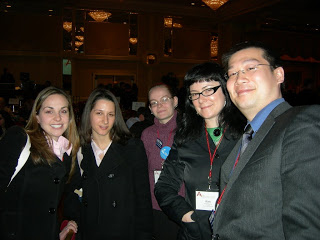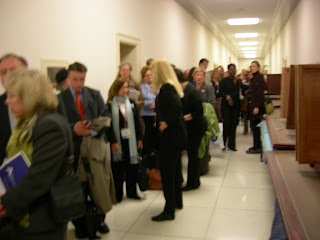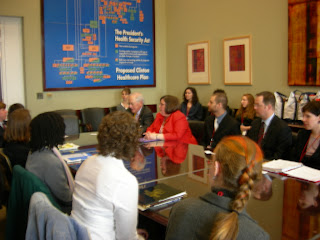
If you don’t get involved, your opponents will
I don’t usually hang around with the likes of Robert Redford, John Legend and Peter Yarrow, but Tuesday, April 1 we were all at the House Office Building in D.C. as part of Arts Advocacy Day. This is the 21st year that Americans for the Arts has organized grassroots advocates from across the country to join in lobbying Congress for arts-friendly legislation.
Actually Redford, Legend et all were among the 200 advocates inside the room where the House Sub-Committee on Interior Appropriations held the first Congressional hearing in 12 years dedicated to the importance of federal arts funding; I was outside with the overflow crowd of more than two hundred who couldn’t fit in the room. After the culture wars that followed the outcry against funding Mapplethorpe, Serrano and others, the NEA’s budget was cut from $176 million to $99.5 (and all grants to individual artists eliminated). Since then it has slowly been recovering; the 2008 budget is $144.7 million.

The crowd in the hall waiting for seats in the hearing room for the House Subcommittee on Interior Appropriations; many were arts professionals from across the country who’d come to D.C. to lobby on behalf of bills funding various arts programs and legislation to support arts education, fair-market value for artists’ donations, preservation of white space radio frequencies used for cordless mikes and an improved visa process for foreign guest artists.
The U.S. is unusual among advanced democracies in having no federal department of culture; current federal arts legislation is spread across more than fourteen Congressional committees which also have responsibility for forest fires, homeland security and the entire tax system. The committees range from the House Ways and Means Committee and the Senate Committee on Labor, Health and Human Services and Education to the House Sub-committee on State and Foreign Operations. This Congress is considering funding for the National Endowment for the Arts, National Endowment for the Humanities, Institute of Museum and Library Services, arts education, and State Department cultural exchanges; tax legislation allowing artists to take fair-market value for donations to museums, and the inclusion of arts education within No Child Left Behind legislation.
As we were told during the training day on Monday, if you don’t get involved, your opponents will. I can’t overemphasize the importance of such lobbying. If you’re not prepared to make the trip to D.C. you can still phone, write or e-mail your senators and representatives about these issues. Legislators want to hear from their constituents, and the more personal your stories about the impact of arts policies and federal funding (which includes federal monies channeled through state and local agencies such as the Pennsylvania Council for the Arts and the Philadelphia Cultural Alliance’s 5-County Arts Fund), the better. You can keep up with current legislation at the Americans for the Arts website; if you sign up, they’ll e-mail you when bills are coming up and action is needed.

Robert M. Lettieri (facing, at left) and Jenny L. Hershour (in red) of Citizens for the Arts in Pennsylvania with other Pennsylvania arts supporters lobbying Senator Arlen Spector’s staff.
Tuesday afternoon I was among the 34 Pennsylvanians who met in Senator Arlen Spector’s office with his staff member, Mary Beth McGowan, to ask for support for arts-friendly bills and to tell stories of how federal funding has benefitted the state. Spector’s a member of the Senate Cultural Caucus and a long-time friend of the arts, but that doesn’t make such visits any less important. The group included 14 students in Drexel University’s Arts Administration program (who had raised their own funds for the trip) and Silagh White of ArtsLehigh, an initiative to integrate arts throughout the curriculum and educate an enthusiastic audience; two Lehigh undergraduates joined her.









